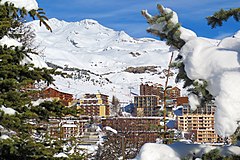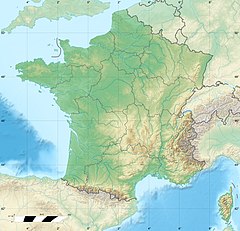Orcières-Merlette, also known as Orcières Merlette 1850, is a ski resort near to Orcières, Hautes-Alpes, in the French Alps. It has been a summit finish for Tour de France stages on multiple occasions, most notably in 1971, when Luis Ocaña beat Eddy Merckx by over eight minutes to take the yellow jersey as leader of the general classification.
| Orcières-Merlette | |
|---|---|
 | |
 Orcières-Merlette in 2013 | |
| Location | French Alps |
| Nearest major city | Gap |
| Coordinates | 44°41′49″N 6°19′19″E / 44.697°N 6.322°E |
| Top elevation | 2,727 m (8,947 ft) |
| Base elevation | 1,850 m (6,070 ft) |
| Skiable area | 607 ha (1,500 acres) |
| Trails | 51 |
| Longest run | 8 km (5.0 mi) |
| Total length | 100 km (62 mi) |
| Snowfall | 500 centimetres (200 in) |
| Website | orcieres |
Location and resort details
editOrcières-Merlette is situated in the French Alps, around 5 km (3.1 mi) from the village of Orcières,[1] on the edge of the Écrins National Park.[2][3] It lies above the town of Gap.[4] The highest point of the resort is Col de Freissinières at 2,727 m (8,947 ft) above sea level.[2]
Orcières-Merlette covers an area of 16,000 m2 (170,000 sq ft). The resort has 30 ski lifts and 51 pistes,[3] totalling over 100 km (62 mi) in length.[5] Orcières-Merlette contains one of Europe's longest zip lines, with a length of 1,870 m (6,140 ft) from Le Drouvet to Lac d'Orcières-Merlette.[3]
History
editOrcières-Merlette was built in the 1960s,[2] and opened in 1962.[5] Since the early 2000s, the resort has been owned by Labellemontagne.[6] Skiers who have used Orcières-Merlette as their home location include Valentin Giraud Moine and Alizée Baron.[7] French rally driver Sébastien Ogier has also worked as a ski instructor at Orcières-Merlette.[8]
In 2019, Orcières-Merlette hosted a "colour" skiing event, which involved being sprayed with coloured powders whilst skiing down the mountain.[9] A 2020 Alpine Skiing Europa Cup Super-G event scheduled to be held at Orcières-Merlette was cancelled due to heavy snowfall and lack of visibility.[10]
Tour de France
editOrcières-Merlette was first used as a Tour de France stage host in 1971 edition,[11] when it was used for the finish of stage 11 and the start of stage 12, including the rest day in between the stages.[12] Luis Ocaña won stage 11, attacking from a group of leading contenders and soloing for the final 60 km (37 mi). He also gained the yellow jersey as leader of the general classification with a finishing margin of 8:42 minutes over the former leader Eddy Merckx.[13] Merckx had won the previous year's race.[14] Following the rest day, stage 12 of the 1971 Tour started with a descent from Orcières-Merlette, which Merckx attacked on with a small group and remained in the lead to the finish in Marseille. Ocaña led the chasing peloton (main field) to limit his loss to Merckx on the stage to two minutes. The leading group broke the record for the fastest average speed of a mass-start Tour de France stage at 45.351 km/h (28.180 mph).[15]
The Tour returned to Orcières-Merlette the following year when it was again used across a rest day.[16] Lucien Van Impe took victory at Orcières-Merlette in the initial stage 11.[17] The next time Orcières-Merlette was visited by the Tour was ten years later in 1982,[11] when it was used for the finish of stage 15, won by Pascal Simon, before hosting the start of the next stage.[17][18]
Orcières-Merlette featured in the 1989 Tour as the finish of stage 15's individual time trial, which was won by Steven Rooks.[19] The yellow jersey was taken by Greg LeMond,[19] in a Tour considered to be one of the greatest in the race's history.[20] The stage also included an ascent of the Col de Manse mountain pass, which stands between Gap and Orcières-Merlette.[19]
Orcières-Merlette was the summit finish of stage 4 of the 2020 Tour, the first time that the race had ascended the mountain in 31 years.[21] The ascent was 7.1 km (4.4 mi) long, with an average gradient of 6.5%.[21] The climb had a reasonably consistent gradient, and features many hairpin turns.[22] It was one of two summit finishes on the first week of the Tour, the other being Mont Aigoual.[23] The stage was won by Slovenian Primož Roglič in a sprint finish.[24]
References
edit- ^ "Orcières et Orcières-Merlette" (in French). Provence Web. Archived from the original on 23 October 2017. Retrieved 21 May 2020.
- ^ a b c "Orcières Merlette 1850". Mountain Passions. 13 August 2014. Retrieved 20 May 2020.
- ^ a b c "Orcières Merlette Overview". On the Snow. Archived from the original on 7 July 2019. Retrieved 20 May 2020.
- ^ "Stage 10: Gap – Marseille". VeloNews. 5 July 2003. Retrieved 20 May 2020.
- ^ a b "Orcières Ski Area". Snow Trex. 19 October 2018. Retrieved 21 May 2020.
- ^ "Plus belle la montagne à Orcières Merlette". La Provence (in French). 17 January 2018. Archived from the original on 17 January 2018. Retrieved 21 May 2020.
- ^ "Deux champions de France de ski pour Orcières Merlette". France 3 (in French). 30 March 2016. Retrieved 21 May 2020.
- ^ "Orcieres Merlette - smučišče v Alpah s pridihom Mediterana". Radiotelevizija Slovenija (in Slovenian). 21 March 2017. Archived from the original on 18 November 2018. Retrieved 21 May 2020.
- ^ "Orcières-Merlette : "Color ski", les skieurs en ont vu de toutes les couleurs". France 3 (in French). 8 April 2019. Retrieved 20 May 2020.
- ^ "Orcières: la Coupe d'Europe de ski annulée à cause d'importantes chutes de neige". frequence-sud.fr. 26 January 2020. Retrieved 20 May 2020.
- ^ a b Augendre 2019, p. 173.
- ^ "Ronde van Frankrijk" [Tour de France]. de Volkskrant (in Dutch). 25 June 1971. p. 13 – via Delpher.
- ^ Fotheringham 2012, pp. 168–169.
- ^ "Eddy Merckx wins the Tour de France for the second time – archive". The Guardian. 20 July 1970. Archived from the original on 9 June 2020. Retrieved 9 June 2020.
- ^ Fotheringham 2012, pp. 170–171.
- ^ "Tour de France 1972". Het Vrije Volk (in Dutch). 1 July 1972. p. 21 – via Delpher.
- ^ a b Woodland 2007, p. 287.
- ^ "Ronde van Frankrijk" [Tour de France]. De Waarheid (in Dutch). 2 July 1982. p. 7 – via Delpher.
- ^ a b c Bingham, Keith (13 July 2009). "1989 Tour de France stage 15: LeMond back in yellow". Cycling Weekly. Archived from the original on 22 August 2019. Retrieved 22 May 2020.
- ^ Bacon, Ellis (25 June 2013). "10 memorable moments from the Tour de France". Cyclingnews.com. Archived from the original on 6 October 2018. Retrieved 6 October 2018.
- ^ a b "Tour de France 2020: 5 key stages". Cycling Weekly. 16 October 2019. Archived from the original on 16 October 2019. Retrieved 20 May 2020.
- ^ "8 key climbs from the 2020 Tour de France". Bike Radar. 18 October 2019. Archived from the original on 27 April 2020. Retrieved 21 May 2020.
- ^ "Revised Vuelta a España route has the toughest first week of any post-war Grand Tour". Cyclingnews.com. 12 May 2020. Archived from the original on 16 May 2020. Retrieved 20 May 2020.
- ^ "Tour de France: Doubts over Roglic's injuries evaporate at Orcières-Merlette". Cyclingnews.com. 1 September 2020. Retrieved 3 September 2020.
Bibliography
edit- Augendre, Jacques (2019). Guide historique [Historical guide] (PDF) (in French). Paris: Amaury Sport Organisation. Archived (PDF) from the original on 13 September 2019. Retrieved 22 May 2020.
{{cite book}}:|work=ignored (help) - Fotheringham, William (2012). Merckx: Half Man, Half Bike. London: Yellow Jersey Press. ISBN 978-0-224-07451-3.
- Woodland, Les (2007). Yellow Jersey Companion to the Tour de France. London: Yellow Jersey Press. ISBN 978-0-224-08016-3.
